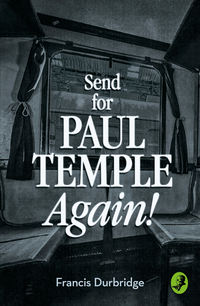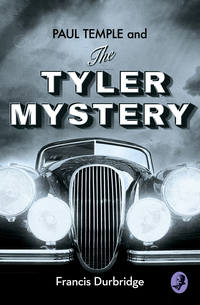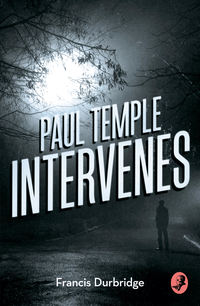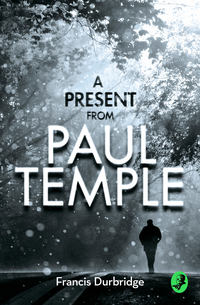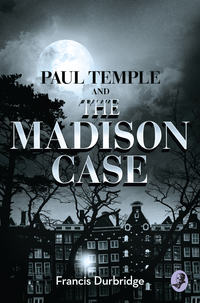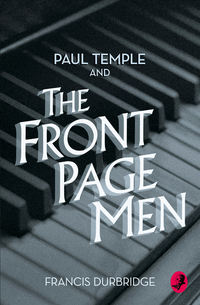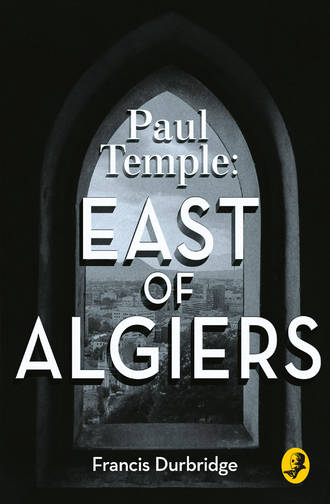
Полная версия
Paul Temple: East of Algiers

FRANCIS DURBRIDGE
Paul Temple: East of Algiers


An imprint of HarperCollinsPublishers
1 London Bridge Street
London SE1 9GF
www.harpercollins.co.uk
First published in Great Britain by
Hodder & Stoughton 1959
Copyright © Francis Durbridge 1959
All rights reserved
Francis Durbridge has asserted his right under the Copyright, Designs and Patents Act, 1988 to be identified as the author of this work
Cover design © HarperCollinsPublishers Ltd 2015
Cover image © Shutterstock.com
A catalogue copy of this book is available from the British Library.
This novel is entirely a work of fiction. The names, characters and incidents portrayed in it are the work of the author’s imagination. Any resemblance to actual persons, living or dead, events or localities is entirely coincidental.
All rights reserved under International and Pan-American Copyright Conventions. By payment of the required fees, you have been granted the non-exclusive, non-transferable right to access and read the text of this e-book on screen. No part of this text may be reproduced, transmitted, down-loaded, decompiled, reverse engineered, or stored in or introduced into any information storage and retrieval system, in any form or by any means, whether electronic or mechanical, now known or hereinafter invented, without the express written permission of HarperCollins.
Source ISBN: 9780008125660
Ebook Edition © June 2015 ISBN: 9780008125677
Version: 2015-06-23
Contents
Cover
Title Page
Copyright
Chapter One
Chapter Two
Chapter Three
Chapter Four
Chapter Five
Chapter Six
Chapter Seven
Chapter Eight
Chapter Nine
Chapter Ten
About the Author
Also in This Series
About the Publisher
Chapter One
‘Pardon, monsieur. This chair – it is occupied?’
‘Yes. I am afraid it is. I am keeping it for a lady.’
For the tenth time a disappointed Frenchman turned away as I laid my hand possessively on the seat of the chair I was keeping for Steve. It was l’heure de l’apéritif, and the tables of all the cafés up and down the Champs–Élysées were filled. The nine gentlemen whom I had already prevented from sitting in Steve’s chair found places elsewhere and were now regarding me with a certain amount of suspicion. I could tell from their expressions that they were beginning to think that my long-awaited wife was a figment of the imagination. Steve herself had assured me that she would have ample time to finish her shopping by twelve o’clock. We had made our rendezvous for midday at Fouquet’s, half-way up the Champs-Elysees, and it was now twenty to one.
Luckily the morning was a glorious one, and the time was passing very pleasantly. The Arc de Triomphe stood out in its crisp greyness against a blue sky and the sun was warm enough to make most people decide to sit at the tables set out on the pavement rather than seek the shade and seclusion of the bar and brasserie inside. The show in front of me was as good as a Music Hall. The Parisian girls in their spring dresses were well aware of the male eyes focused on them as they walked with self-conscious elegance down the broad pavement. Every now and then a sleek car rolled to a halt, its wheels touching the edge of the pavement, and disgorged its passengers into one of the cafés. Further away, on the roadway proper, cars were racing six deep down the hill. Every time the traffic lights changed to red, their tyres shrilled as the brakes were mercilessly applied. A minute later, when the signal changed to green, every engine whined in misery as each driver tried to win the race to the next intersection.
I was just ordering a second Martini when one of the new small Dauphine taxis drew up in front of me. The driver opened his door, and I recognized the long, slim leg that felt its way down to the pavement. I was unable to see its owner because of the mass of parcels and boxes which she was trying to manoeuvre through the narrow door. With the true Parisian’s instinct to help a pretty woman, the taxi-driver had bustled out of his seat, and he now took charge of the two largest boxes. I think he was a little disappointed when Steve led him towards me and explained that I would pay his fare.
‘I haven’t a sou left, but I’ve found some of the most wonderful bargains. Really there’s nowhere in the world like the Rue St. Honoré. Darling, this is Judy Wincott. She’s going to join us for a cocktail.’
I suppose I had seen the girl follow Steve out of the taxi with the corner of my eye, but the business with the driver and the fare and the parcels and the general impact of Steve’s arrival had diverted my attention from her. I turned to shake hands. She was a smallish girl of about twenty-one. She could have been described as good-looking, for her features followed the pattern which is generally approved by film periodicals and fashion magazines, but I somehow could not find her very attractive. There was a suggestion of aggressiveness, or perhaps efficiency, which made me write her off as not quite my type. I don’t mind women being efficient, but I don’t think it ought to show.
‘Oh, Mr. Temple,’ she said as I shepherded my two charges through the maze of tables, ‘I hope you don’t mind my jumping at the chance of meeting you. Is it really true that your books are based on actual cases you’ve been involved in?’
‘Yes, as a matter of fact it is. Do sit down. I’ll try and get us another chair.’
Steve had sat down and was disposing her purchases round her feet. I was doling out notes to the taxi-driver with one hand and signalling to the waiter to bring a third chair with the other.
The girl was still looking at me as if she expected I might utter some Confucian epigram.
‘It’s amazing to think such things actually do happen,’ she said. There was a slight but unmistakable American intonation in her rather high voice.
‘What you read in the books is really not so extraordinary. My trouble is I can’t write about the most astonishing cases. No one would believe me if I did.’
‘Oh, I think you should,’ Judy Wincott said with a dazzling smile. ‘I would believe you at any rate.’
The waiter produced a chair from somewhere inside the sleeve of his jacket and by judicious squeezing and elbow prodding we were soon all three ensconced around the small table.
‘Miss Wincott was very kind,’ Steve explained when I had ordered drinks. ‘I would never have found the kind of shoes I wanted if she had not told me about Chico’s.’
‘You know Paris well, Miss Wincott?’
‘Not really well, as I should like to. But I do know the principal streets. I’ve been over two or three times with my father. He come to Europe every year – to hunt out old pictures and antiques and things. He’s Benjamin Wincott, the antique dealer, you know. He has a very important shop in New York. Perhaps you’ve heard of it?’
‘No. I’m afraid I haven’t.’
‘It’s very well known,’ Miss Wincott resumed her recital cosily. ‘Of course he has to travel a great deal. It’s no good relying on other people’s judgement when so much money is involved, is it, and then again Daddy’s got such an amazing instinct for what is really good. There aren’t many countries in the world he hasn’t visited. China, Japan – why we’ve only just made a little hop across to Tunis to buy a collection of very rare amber pendants. Mrs. Temple tells me you’re planning to go on there yourselves in a day or two.’
I caught Steve’s eyes for an instant, and her expression confirmed my suspicion that it was more by her own invitation than by Steve’s that Miss Wincott had favoured us with the pleasure of her company.
‘We may go on there after we’ve had a look at Algiers,’ I admitted.
‘To get material for a novel?’ Judy Wincott prompted quickly.
‘That’s the main idea.’
The waiter set the three glasses down expertly, each in front of its proper owner. The American girl had ordered a champagne cocktail. I watched her hand close round the stem and suppressed the beginnings of a shudder. Her nails had been allowed to grow a quarter of an inch beyond the ends of her fingers, filed to a point and carefully enamelled a glistening blood-red colour. She took a sip of her drink and gave a quiet laugh, as if she were remembering some good but private joke.
‘I certainly had a good time in Tunis. Talk about champagne! I wonder if you’ll meet a boy I got to know quite well, even during the short time we were there. His name’s David Foster; he works for Trans-Africa Petroleum.’
She gazed at me enquiringly. Not being a seer I could not tell her whether I was likely to meet Mr. Foster of Trans–Africa Petroleum or not. What I really wanted to do was have a chance to talk to Steve and find out what on earth she had in that mountain of parcels.
I muttered: ‘Well, Tunis is a pretty big city, I remember hearing.’
‘You’re dead right,’ Miss Wincott agreed reminiscently. ‘David and I certainly turned it inside out that last night. The funniest thing happened…’
This Judy Wincott was clearly one of those non-stop expresses. Here we were on a sunny spring morning in the most civilized city in the world, condemned to listen to the egotistical babblings of a spoilt child. I took a long pull at my Martini, but it tasted bitter.
‘You’ll never believe this,’ she forged on. ‘When we ended up at my hotel somewhere around dawn, David found he had lost his glasses. He was so high he hadn’t noticed till then. Well, we searched everywhere. He still hadn’t found them when Daddy and I left for Paris that afternoon. And do you know where they turned up?’
Judy Wincott turned enquiringly first to Steve and then to me. Neither of us knew the answer.
‘You tell us,’ I suggested.
‘The customs man at Orly airport found them in my evening handbag when he searched my case.’
Steve and I snickered politely. Miss Wincott laughed richly and then suddenly stopped. She had had an inspiration.
‘Say, this is rather a lucky coincidence. Your going on to Tunis, I mean. You could take David’s glasses back, couldn’t you? I hope you don’t mind my asking.’
‘Well, I suppose we could, though I think they’d get there much quicker if you sent them by ordinary mail. We don’t expect to be there ’till Thursday.’
‘No, I can’t do that. David’s cable said on no account to send them by ordinary mail. They’d be sure to get broken or lost. Poor lamb, he’s absolutely stricken without them.’
I suppose it was the vision of a distant but stricken lamb that softened my heart. Steve shot me a glance which I interpreted as meaning: ‘Do the decent thing. Don’t let the nation down.’ So in a moment of weakness I consented.
‘That’s swell,’ Miss Wincott said, and polished off her champagne cocktail. ‘Now it’s just a question of how to get the spectacles to you. What hotel are you staying at?’
‘We’re not at a hotel this time,’ Steve explained. ‘Some friends of ours have a flat just round the corner in the Avenue Georges V, and they’ve lent it to us for a day or two. We’ll be in this evening. Why not come round about seven and have a drink with us? It’s number eighty-nine.’
‘Oh, no.’ Now that she had what she wanted Miss Wincott was prepared to play shy. ‘You’ve seen enough of me already. I’ll only pop in for a tiny moment.’
I noticed with relief that she was gathering up her gloves and preparing to leave us. Lest she should change her mind I stood up and made way for her to pass by. Her farewells were hasty but effusive. We watched her weave her way through the pedestrians on the pavement and hail a passing cab with an imperious stab of her forefinger. She waved back to us as she was borne down the street towards the whirlpool of vehicles in the Place de la Concorde.
‘You do pick up some odd friends,’ I reproached Steve.
‘I couldn’t do less than ask her to join us. I was absolutely floundering in the Galeries Lafayette when she rescued me. She spent a whole hour showing me where the best shops were. Then when I told her who I was she seemed pathetically anxious to meet you.’
‘I didn’t think there was anything very pathetic about Miss Wincott. I would say that everything she does is aimed somehow to promote her own interests.’
‘Well,’ Steve said, ‘I think it shows a nice side of her nature to be so anxious to get that poor man’s glasses back to him.’
‘I suppose it’s possible,’ I admitted against my better judgement. ‘Drink up, Steve. We’re supposed to be meeting the de Chatelets at one, and we shall have to dump your parcels at the flat before then.’
We lunched well but not wisely at the de Chatelets’, and then went to see the Exhibition of pictures at the Orangerie. It was almost seven when we got back to the flat in the Avenue Georges V. I had quite forgotten about Judy Wincott, and was sousing my head in cold water when the door bell rang. I combed my hair hurriedly and went to open it.
‘Ah,’ I said when I saw who it was. ‘Come on in. We’re just going to have a drink.’
Judy Wincott was flushed and panting, as if she had run all the way up to the fourth floor. She was wearing the same clothes as before lunch and did not look as if she had even taken time to do her face up.
‘I mustn’t stay,’ she said breathlessly. ‘Daddy and I are dining at the Embassy and I have a taxi waiting. There are the glasses. David’s address is inside the case. I sent him a cable to say you’d be arriving on Thursday, and asked him to meet the Algiers plane.’
She had already gone when Steve came through the double doors that led into the hall, dressed in one of the creations she had bought that morning.
‘Has she gone already?’
‘Dinner at the Embassy and a carriage waiting without,’ I explained, looking down at the spectacles case.
The case was a plain leather one bearing no maker’s name. When I opened it a folded sheet of paper jumped up. It bore the heading of the Hotel Bedford in Paris, and a brief message in flowing characters:
David Foster,
c/o Trans-Africa Petroleum, Tunis.
from Judy. ‘In Memoriam.’
The spectacles were what is known as the Library style. They were made of very strong and thick tortoiseshell with broad side-pieces which folded protectively over the lenses.
I put them on the bridge of my nose and immediately almost fell over. The lenses were strong and thick and my vision seemed to be twisted into a knot. I took them off hastily and found Steve convulsed with laughter.
‘You really ought to wear glasses, Paul,’ she said illogically. ‘They make you look so learned.’
‘This chap Foster must be very near-sighted. No wonder he’s hollering for his specs. He must be almost blind without them.’
Steve and I travelled on the afternoon plane to Nice next day. It would have been possible to fly direct to Algiers, but Steve finds that long periods at high altitudes tend to make her head ache. Besides, we both have a particular weakness for the Côte d’Azur and are glad of any excuse to spend a day or two there.
We had booked rooms at a hotel where we had stayed before, just a little way along the Promenade des Anglais from the Negresco. It is a small but very luxurious place and the service is usually impeccable. That afternoon, however, several guests had arrived at the same time, and the reception clerk was in a flat spin. One of the uniformed chasseurs accompanied us and our luggage up to the first floor. Even before we turned into the corridor where our room was we could hear the metallic clatter of a key being turned vainly in a lock. Another chasseur with a very English-looking guest in tow was trying to open the door of number twelve, the room next to ours. A moment later our own chasseur was twisting his key in the lock, rattling the handle and generally behaving like a bad case of claustrophobia.
Suddenly the English-looking guest pushed his chasseur aside, took the key out of the door of number twelve, marched up to number thirteen, pushed the second chasseur to one side and exchanged the keys. He turned the key and immediately our door swung open. He spun on his heel and directed a suspicious nod at us.
‘Pardong, Mushoor,’ he said in terrible French. ‘Vous avez mon clef.’
‘Not my fault,’ I answered in English. ‘The desk clerk had his wires crossed.’
The other man started; then his face expressed relief and returning faith.
‘English, are you? Well, that’s something. For a moment I thought someone was trying to play a trick on us, and Sam Leyland doesn’t like that kind of thing.’
Lancashire and proud of it. His voice was powerful and resonant, his dress equally so. He wore a grey check suit which must have been tailored to accommodate the bulge of his stomach. His shoes were rather on the yellow side, but very shiny and amazingly small by comparison with his enormous but top-heavy body. He sported a silk tie with a picture of a ballet dancer on the swelling part, and a fading rose in his button-hole. His face was red and washed-looking; the dome of his head glistened and was innocent of hair. His nose had been broken, perhaps during some encounter with a lamp-post or a business associate. I put him down as one of that breed of Company Directors who by mysterious means make enough money to travel abroad and carry the Union Jack into the Casinos of furthermost Europe. Still, I could not help rather liking him, though I would not have trusted him to time my egg boiling.
‘I don’t think it was done on purpose,’ I reassured him. ‘They’re usually pretty good here.’
‘They’d better be,’ the Lancashire man said. ‘Their prices are steep enough, and if there is one man who’s going to see value for money that’s Sam Leyland.’
He was beginning to look angry again, so when Steve began to retreat into our room I followed her.
‘Who’s this Sam Leyland he was talking about?’ she asked me when the door was shut. ‘He sounds simply terrifying.’
‘Don’t be an ass. That was Sam Leyland himself.’
We were destined to encounter Sam later that evening. We were returning from a particularly good dinner at La Bonne Auberge soon after ten-thirty. The lift was taking someone up to the top floor, so we decided it would not kill us to use the stairs, though the idea was abhorrent to the night porter, so much so that he almost used physical force to prevent us.
There was no mistaking the voice which we could hear upraised in anger, and when we came round the corner we were not surprised to see Sam Leyland, still with his hat on his head, standing over a terrorized chamber-maid and raising all hell with her. He had found some neutral language, half-way between French and English, which was utterly incomprehensible to anyone else.
When we appeared he shrugged his shoulders and turned away from the chamber-maid in disgust. The demoralized girl seized her chance to scuttle down the corridor and bolt herself into a small room with her brooms and pails.
‘I knew there was some monkey business going on here,’ Sam thundered as he advanced threateningly on us. ‘And someone’s going to pay for it or my name isn’t Sam Leyland.’
‘What’s the trouble? Have they switched keys on you again?’
Sam’s eyes were rather like an angry porker’s, small and fierce, but uncomprehending. He seemed about to speak, but words failed him and he expelled a long breath.
‘Come and take a look at this.’
He led the way towards the door of his room. It was open and the key was still on the outside of the lock. The decorative scheme was the same as ours; faint lilac walls, deep blue curtains, black fitted carpet and modern furniture in very light-coloured natural wood. The only real difference was that Sam’s room contained a single bed instead of a double and was in a state of unimaginable disorder.
‘By Timothy, what a mess! No mistaking the fact that you’ve had a visitor.’
Sam’s answer was a low growl. It was easy to sympathize with his rage. Every drawer had been wrenched open and its contents scattered on the floor, the bedclothes had been torn off and the edges of the mattress ripped open. The pillows had been disembowelled and feathers were everywhere. Sam’s cases had been opened and the linings cut loose. Even his shaving set in its leather case had been torn apart and the case ripped up. The general impression of violence and desperation was frightening.
‘How simply awful!’ Steve exclaimed. ‘It must have been a thief. Did you leave anything valuable here?’
For the first time an expression of pleasure flickered across the burly man’s face. He patted the bulge of his wallet pocket and nodded wisely at Steve.
‘My valuables are all tucked safely away in here. Sam Leyland doesn’t believe in taking chances. The best this scallywag is likely to have got away with is a pair of Woolworth’s cuff links. It’s the mess he’s made that annoys me. Well, the hotel staff will just have to find another room for me.’
I felt Steve’s fingers suddenly tighten on my arm.
‘Paul! The diamond brooch you gave me for my birthday. I left it in the drawer of my dressing-table.’
It was with an absolute conviction that I would find our own room in the same state of disorder that I fumbled the key into the lock and felt for the light switch. The room sprang into relief as the indirect lighting above the wall fluting flooded the ceiling. I heard Steve’s sigh of relief when she saw that our room appeared to be just as we had left it. The telephone was ringing, but she ignored it and pushed past me to go towards the dressing-table. I saw her open the drawer, feel around inside, and then hold up the glittering brooch. She was smiling with relief.
‘I’m glad he didn’t find this.’
‘Steve!’ I remonstrated. ‘How many times have I warned you not to leave valuables in hotel bedrooms?’
‘I didn’t mean to, darling. If you hadn’t kept telling me to hurry up I would never have forgotten it.’
There is no answer to that sort of remark, so I crossed the room, sat on the edge of the bed and picked up the telephone receiver.
‘Hello. Temple here.’
‘Monsieur Temple? I am so sorry to disturb you, monsieur, but a police inspector is here and he wishes to speak with you immediately.’
It was the voice of the night-duty clerk at the reception desk.
‘Does he say what it is about?’ I asked. I was thinking that if they were already on to the hotel thief the police in this part of the world were pretty fast movers.
‘No, monsieur. He says it is very urgent and he must see you at once.’
I took time to light a cigarette before going down the stairs again. When I reached the foyer I saw the desk clerk nod to a man who was sitting in one of the arm-chairs. He rose at once and came forward to meet me.
Being accustomed to working with the officers of Scotland Yard I was prepared for something rather different. To begin with, this man’s size would have prevented him from entering our Police Force. He was too small, perhaps not more than five foot five. He was dark and concentrated, very neat in his appearance and turn-out, with black hair brushed smoothly back, slick collar and shirt cuffs, well-cleaned shoes. His head seemed big by comparison with his body and his eyes extraordinarily keen. He looked more like a musician than a policeman.


